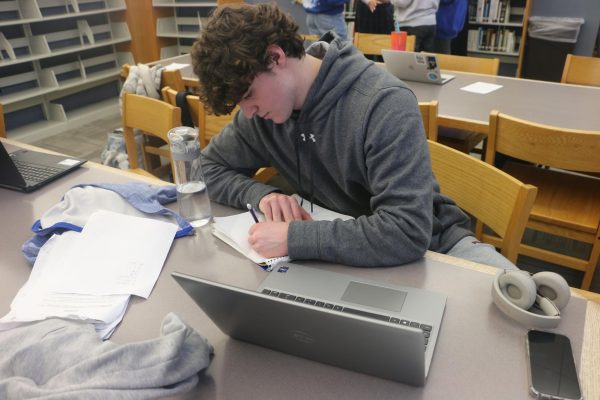For junior Sophia Fu, president of Mu Alpha Theta, IndyIntegirls and an AP Scholar with Distinction, college admissions are incredibly important.
“I’m a junior, so people talk about college and that kind of stuff a lot in the hallways and whatnot. I want to apply to Ivy League schools next year, so hearing people doing more impressive things than me can be disheartening at times. But I try to be happy for them,” Fu said. “I think people take junior year very seriously to get into college; (we) make sure our grades are high, and we have decent extracurriculars, in hopes of getting into a good college and making a future for ourselves.”

Like Fu, senior Matthew Paraboschi, a National Merit Semifinalist and CHS Top Scholar, said he wants to attend an elite university where he can leave with the tools for success.
“I just like (elite colleges), specifically UChicago; I really like the math department and they are excellent in economics, which I might want to pursue,” Paraboschi said. “(Ivy League schools) have valuable networking opportunities and I want to be surrounded by other high performers. The environment might be stressful but it would help me do better academically.”
Fu and Paraboschi aren’t alone in their ambitions of attending an Ivy League school. According to Crimson Education, a college admissions counseling program, 410,500 students applied to Ivy League universities for the 2023 college admissions cycle. Despite this record-high number of applicants, only 12,315 students (about 3%) were admitted into these prestigious Ivy League universities. This high level of competition to get into top schools can significantly increase academic competitiveness among students.
Academic Competitiveness At CHS

Counselor Melinda Stephan, who works in the College Career Resource Center, said students at this school face a lot of academic competition.
“In the context of the college admissions process, I’d say (Carmel) is pretty competitive in certain circles for sure. We have students who are aiming for highly selective schools that admit less than 15% of students, as low as 5% of students,” Stephan said. “I think there is a sense of competition for sure, (especially) amongst students who are vying for those particular schools as places they want to land because they know it’s competitive. They know that very qualified students don’t get into those schools, they are competitive with other students at Carmel but also with other students across the nation.”
Fu said she agreed with Stephan and she said she’s experienced a lot of academic competition which has influenced her to compare herself with her peers.
“We go to Carmel and Carmel is a crazily competitive school, so sometimes you’ll hear people in the halls talking about summer programs or internships, and you kind of think, ‘Oh am I doing enough?” Fu said. “When you’re taking AP classes, there are kids around you who are doing crazy things, and they’re crazily smart. So I guess you kind of want to fit in and be smart like them. I used to compare myself a lot to others in freshman/sophomore year; I guess I still do that (because) junior year people really take competitiveness to the next level. But I try to be happy for what other people are accomplishing. I try to stay out of the toxicness (of comparison).”

Paraboschi said academic competitiveness at this school has made him feel worse about his capabilities at times, but overall he said it’s helped motivate him to do better academically.
“It’s very competitive (here) because everyone’s comparing their grades. Like I compare my grades (with others) and I’m like, ‘Wow I got an “A-” on that’, when someone else got an “A” it makes me feel bad a little bit,” Paraboschi said, “but I feel like it just makes me want to do better because I can’t let (bad grades) happen. I just prefer to be better.”
Paraboschi said Carmel’s high academic competitiveness started at the middle school level for him.
“Middle school is set up where you have all your classes and you’re on one of the teams,” Paraboschi said. “Some teams are more academically inclined than others, so you’re surrounded by people who are high performers, so you think everyone’s supposed to perform at a high level. The (academic competitiveness) kind of builds up from there and gets worse in high school.”
The Effect of Academic Competitiveness on Students
When asked about how academic competitiveness affects students, Stephan said it varies from student to student, as some take it negatively and others take it positively.
“(Academic competitiveness) runs the spectrum for students. There are some negative effects in terms of stress, pressure, burnout and sort of self-defeating attitudes at times, but it can also be motivating for students,” Stephan said. “They could want to rise to the expectations, rise to be among a group of students who are a part of things like Distinguished Graduate or part of Top Scholars and other things like that.”
Fu said academic competitiveness led to burnout in her sophomore year, which affected her relationships with school and her ability to create relationships with others.
“Last year (sophomore year), I took more AP classes and realized it wasn’t necessarily the best for my mental health. I felt really burnt out. I went from taking one AP (class) to taking six AP classes, so that transition was really bad for me,” Fu said. “When I was burnt out, I think the biggest thing it affected was my relationship with school, including teachers and friends. I guess I didn’t always take the most initiative to form those meaningful connections because I was so worried about school all of the time. I also think I formed a kind of negative relationship with school. I wasn’t excited to learn, which wasn’t good for me.”
In contrast, Paraboschi said being in an academically competitive environment has impacted him more positively than negatively. ”
“I think if I wasn’t surrounded by people that I know are smarter than me, I wouldn’t think to work harder or want to get better at things,” Paraboschi said, “whereas at Carmel, there are definitely people that do better than me in certain classes and it’s nice to sometimes ask them for help or get to know them.”
Following Personal Passions
Fu said by letting go of the academic competitiveness and following her passions, she’s been able to manage her relationship with school better.
“One thing that’s very important to me (now) is finding stuff that I genuinely care about, whether it be in the classes I take or the extracurriculars I pursue. This has helped me because now I’m excited to learn and excited to pursue the things I want to do,” Fu said. “This year I’m also trying to take things easier, and I don’t actually feel burnt out. Actually, I feel really excited to go to school and learn new things.”
In honor of National College Decision Day on May 1, Stephan said she urges students to forge their own post-high school path and not compare themselves to others.
“What I tell students is (to) take a step back and ask yourself why you’re doing the things you’re doing. Do you enjoy the things you’re doing or are you doing them because you have to or other people tell you you have to?” Stephan said. “You have to ask yourself why you’re pursuing certain things. If the answer is not because you’re interested, passionate or good at the things you’re doing, then it might be a wake up moment to understand you shouldn’t keep doing those things. It’s about the quality of your experiences not about the quantity. You only have so many hours in a day, fill them doing things you enjoy and are passionate about.


